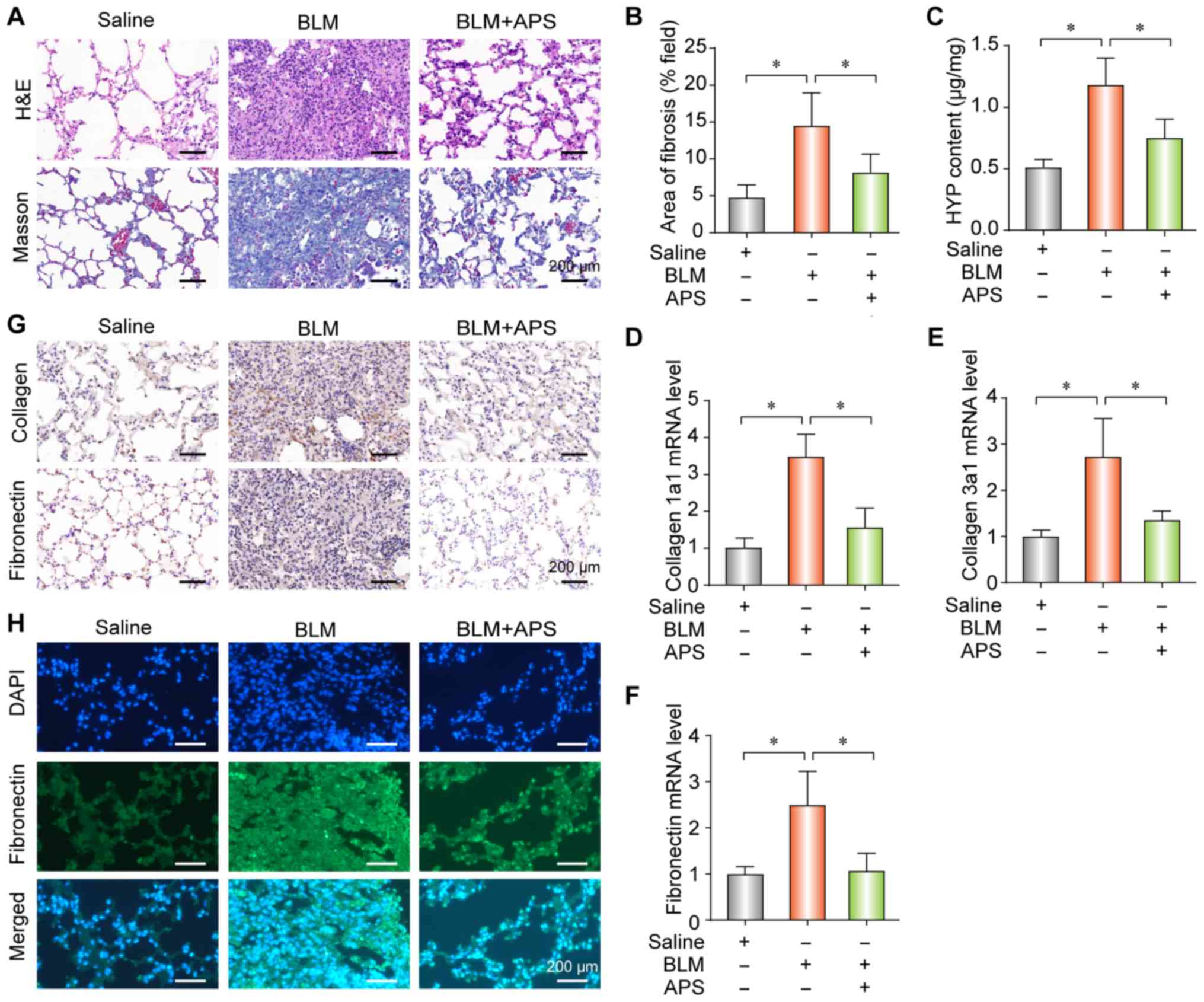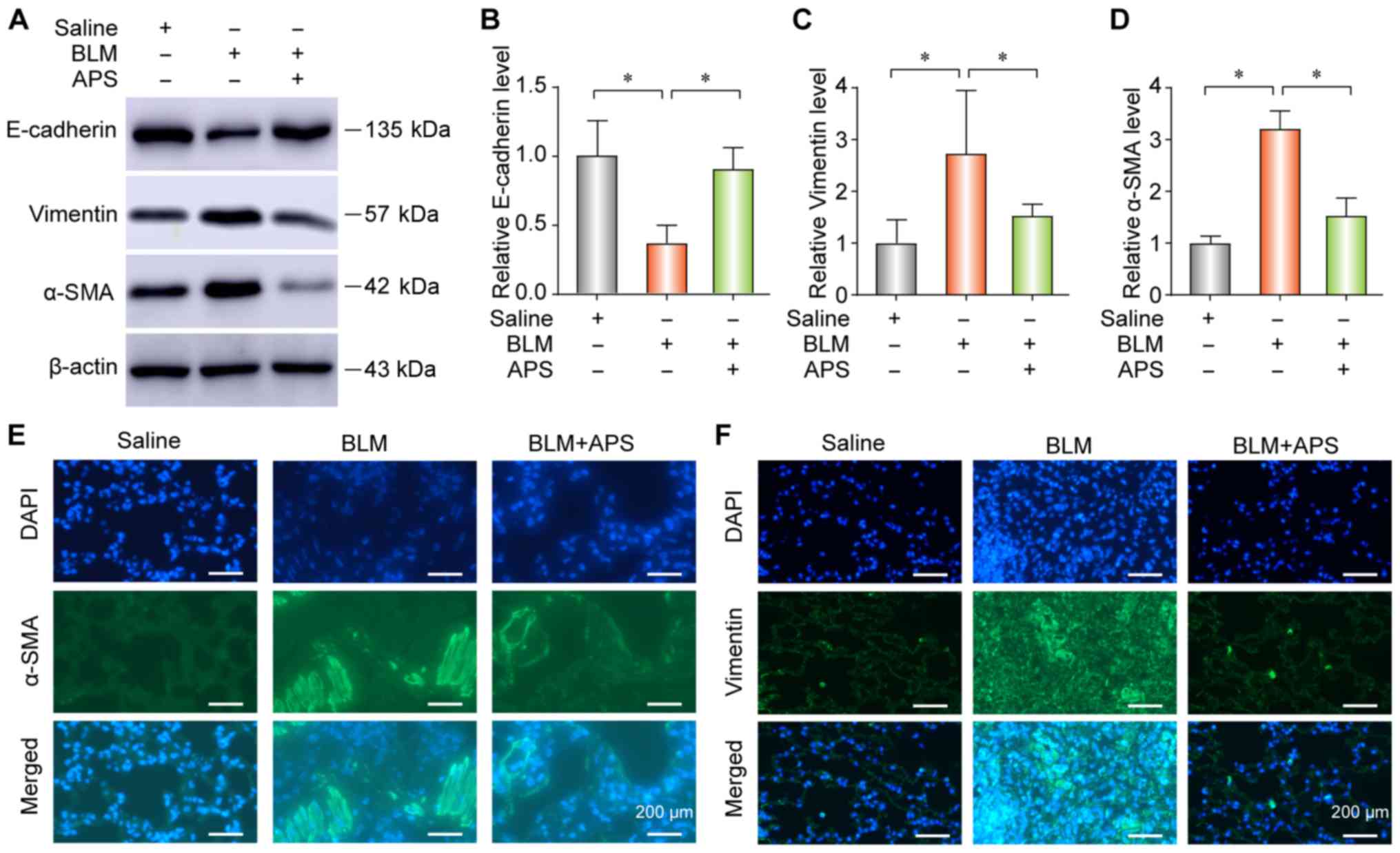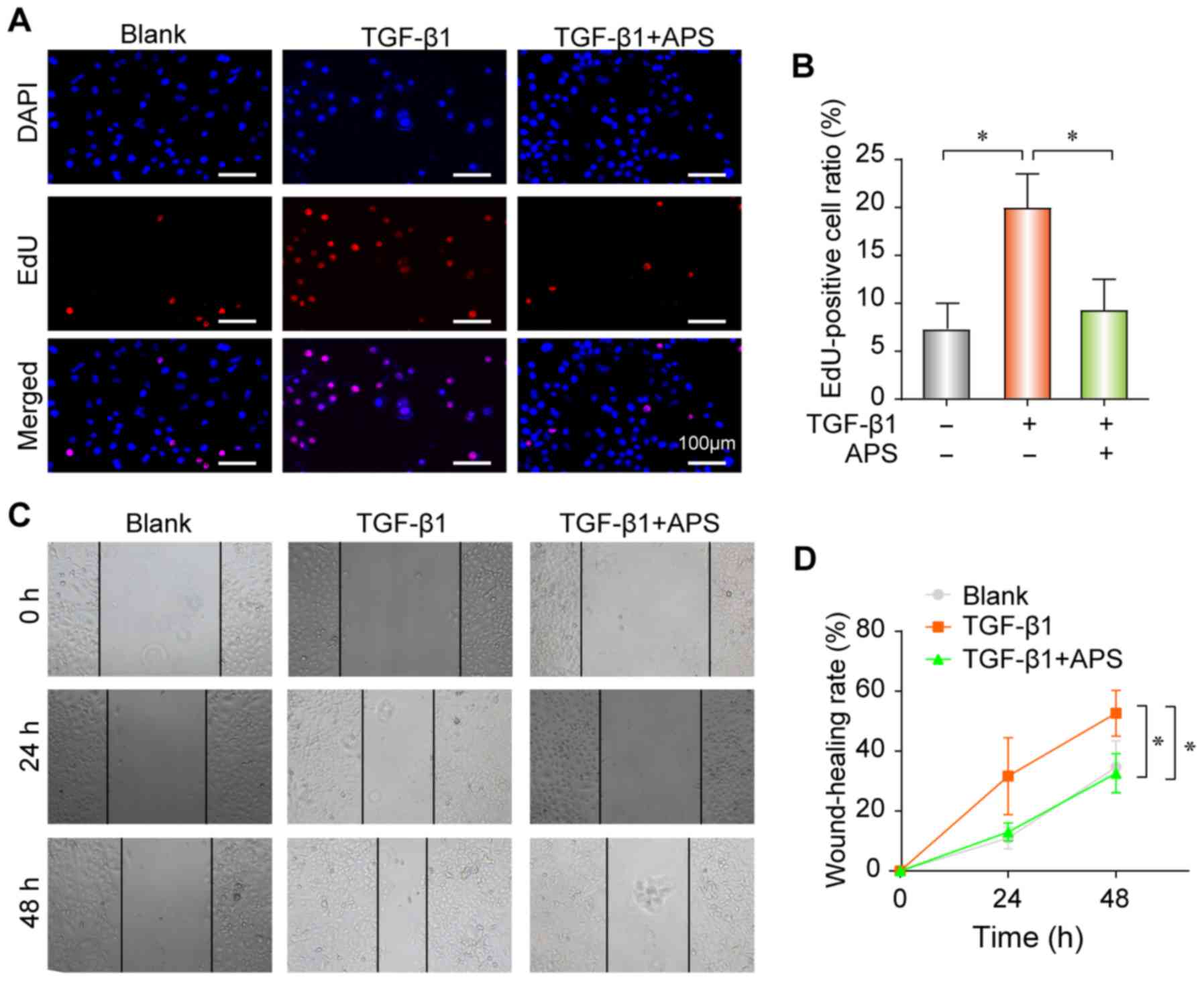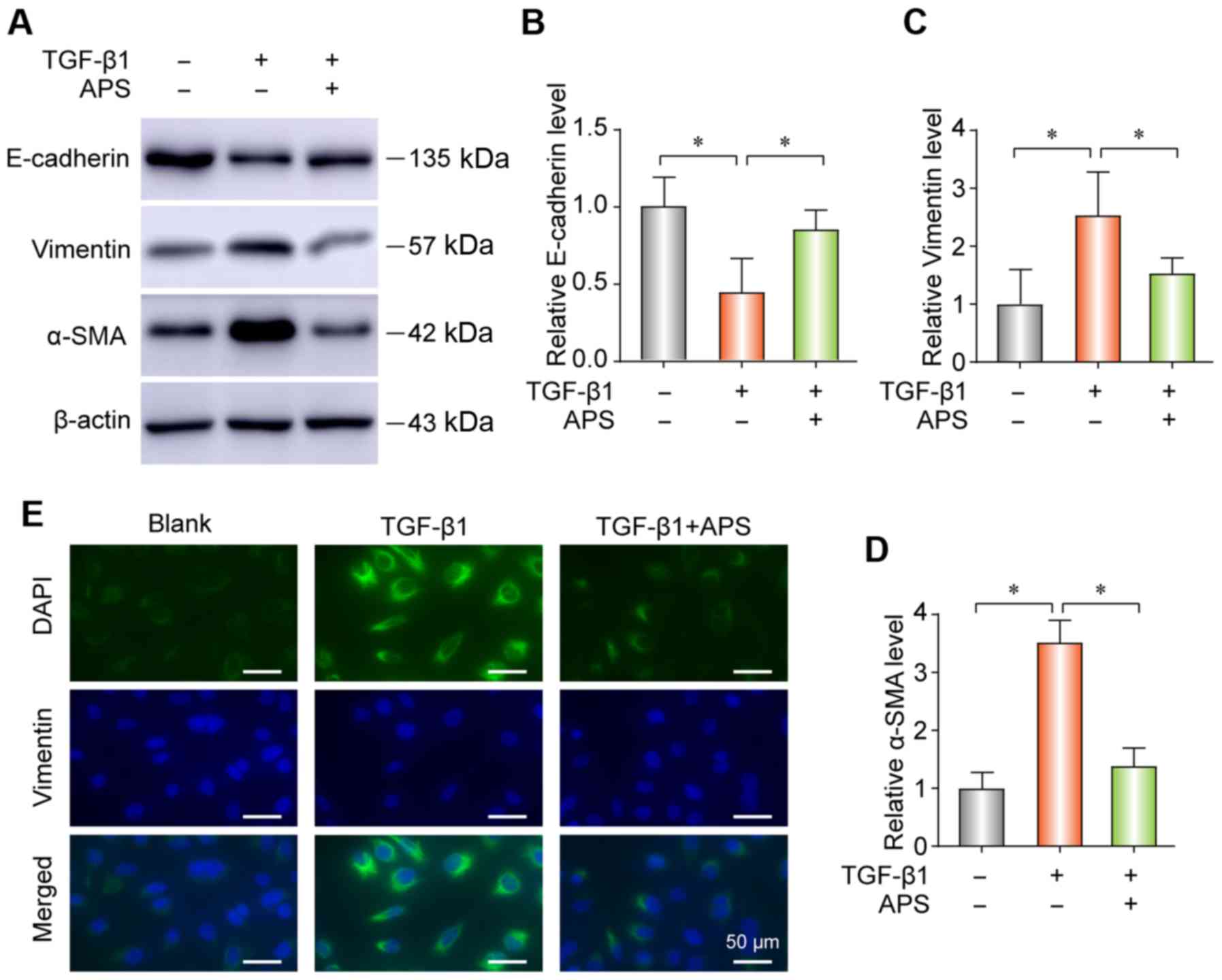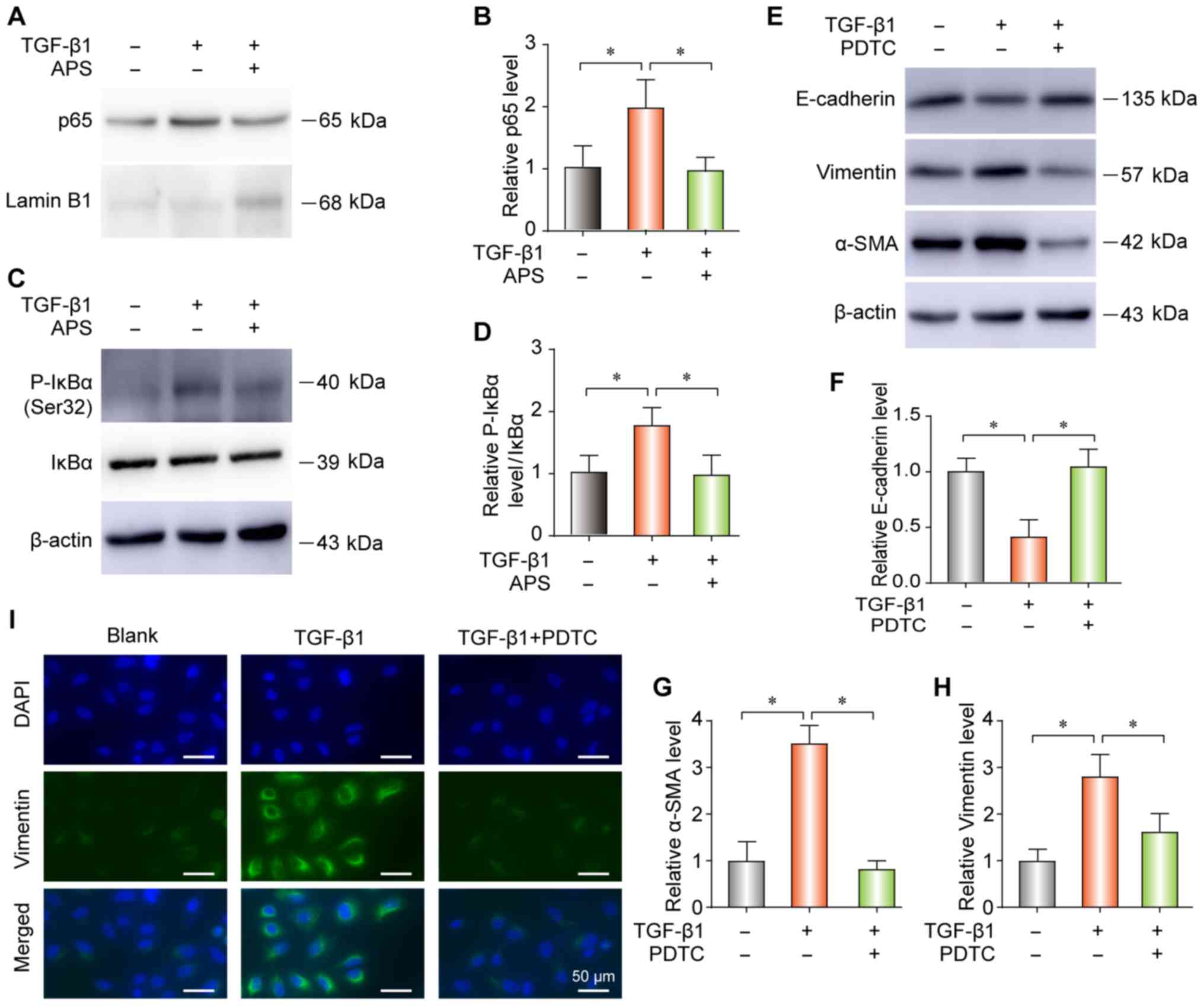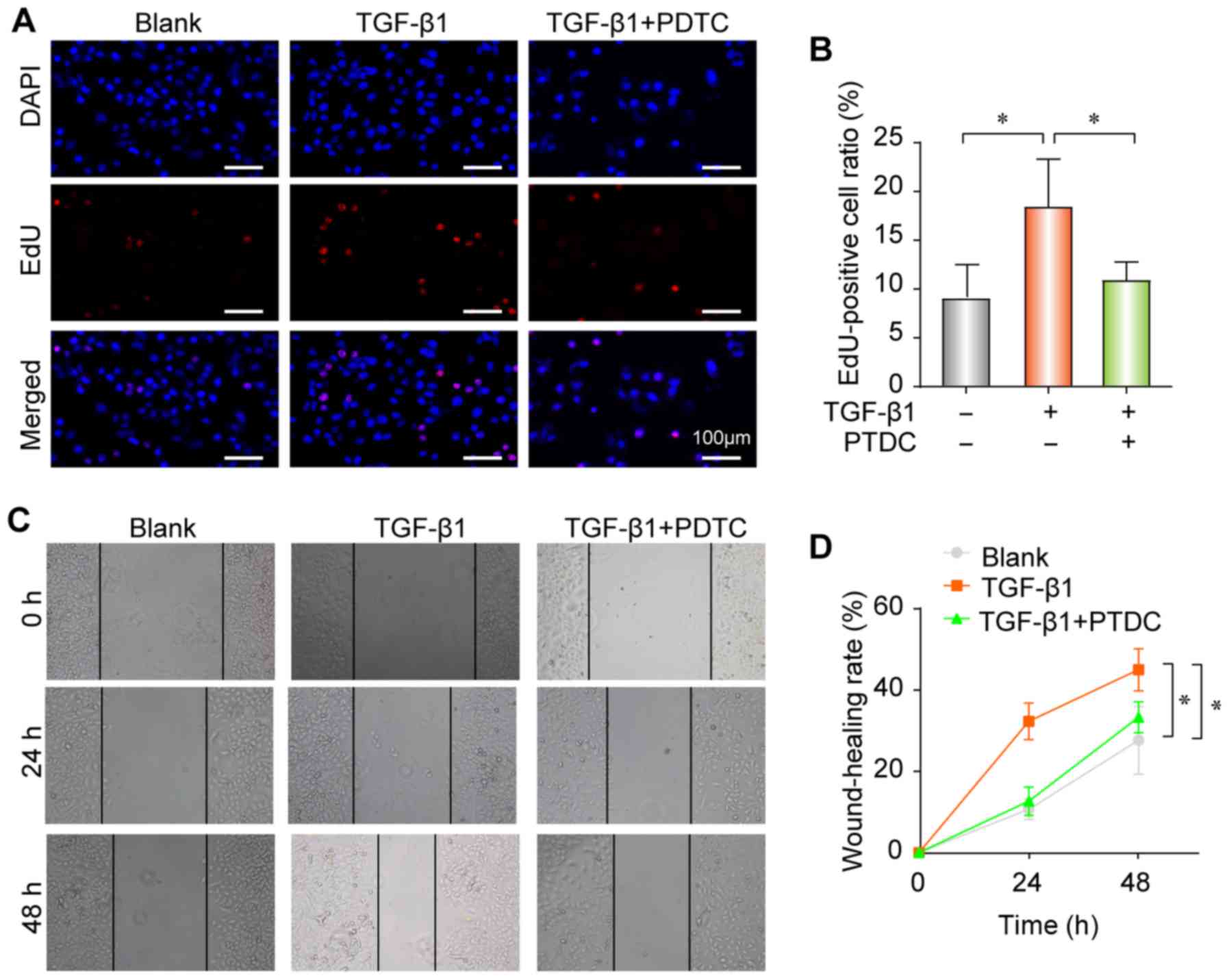|
1
|
Lederer DJ and Martinez FJ: Idiopathic
pulmonary fibrosis. N Engl J Med. 378:797–798. 2018. View Article : Google Scholar
|
|
2
|
Richeldi L, Collard HR and Jones MG:
Idiopathic pulmonary fibrosis. Lancet. 389:1941–1952. 2017.
View Article : Google Scholar : PubMed/NCBI
|
|
3
|
Hutchinson J, Fogarty A, Hubbard R and
McKeever T: Global incidence and mortality of idiopathic pulmonary
fibrosis: A systematic review. Eur Respir J. 46:795–806. 2015.
View Article : Google Scholar : PubMed/NCBI
|
|
4
|
Wolters PJ, Collard HR and Jones KD:
Pathogenesis of idiopathic pulmonary fibrosis. Annu Rev Pathol.
9:157–179. 2014. View Article : Google Scholar :
|
|
5
|
Raghu G: Idiopathic pulmonary fibrosis:
Combating on a new turf. Lancet Respir Med. 4:430–432. 2016.
View Article : Google Scholar : PubMed/NCBI
|
|
6
|
Liu YM, Nepali K and Liou JP: Idiopathic
pulmonary fibrosis: Current status, recent progress and emerging
targets. J Med Chem. 60:527–553. 2017. View Article : Google Scholar : PubMed/NCBI
|
|
7
|
Vancheri C, Kreuter M, Richeldi L, Ryerson
CJ, Valeyre D, Grutters JC, Wiebe S, Stansen W, Quaresma M,
Stowasser S, et al: Nintedanib with add-on pirfenidone in
idiopathic pulmonary fibrosis. Results of the INJOURNEY trial. Am J
Respir Crit Care Med. 197:356–363. 2018. View Article : Google Scholar
|
|
8
|
Wang R, Sun Q, Wang F, Liu Y, Li X, Chen
T, Wu X, Tang H, Zhou M, Zhang S, et al: Efficacy and safety of
chinese herbal medicine on ovarian cancer after reduction surgery
and adjuvant chemotherapy: A systematic review and meta-analysis.
Front Oncol. 9:7302019. View Article : Google Scholar : PubMed/NCBI
|
|
9
|
Zhai B, Zhang N, Han X, Li Q, Zhang M,
Chen X, Li G, Zhang R, Chen P, Wang W, et al: Molecular targets of
β-elemene, a herbal extract used in traditional Chinese medicine,
and its potential role in cancer therapy: A review. Biomed
Pharmacother. 114:1088122019. View Article : Google Scholar
|
|
10
|
Lin S, An X, Guo Y, Gu J, Xie T, Wu Q and
Sui X: Meta-analysis of Astragalus-containing traditional chinese
medicine combined with chemotherapy for colorectal cancer: Efficacy
and safety to tumor response. Front Oncol. 9:7492019. View Article : Google Scholar : PubMed/NCBI
|
|
11
|
Liu C, Li H, Wang K, Zhuang J, Chu F, Gao
C, Liu L, Feng F, Zhou C, Zhang W and Sun C: Identifying the
antiproliferative effect of Astragalus polysaccharides on breast
cancer: Coupling network pharmacology with targetable screening
from the cancer genome atlas. Front Oncol. 9:3682019. View Article : Google Scholar :
|
|
12
|
Huang KC, Su YC, Sun MF and Huang ST:
Chinese herbal medicine improves the long-term survival rate of
patients with chronic kidney disease in taiwan: A nationwide
retrospective population-based cohort study. Front Pharmacol.
9:11172018. View Article : Google Scholar : PubMed/NCBI
|
|
13
|
Chen X, Chen X, Gao J, Yang H, Duan Y,
Feng Y, He X, Gong X, Wang H, Wu X and Chang J: Astragaloside III
enhances anti-tumor response of NK cells by elevating NKG2D and
IFN-γ. Front Pharmacol. 10:8982019. View Article : Google Scholar
|
|
14
|
Ren L, Guo XY, Gao F, Jin ML and Song XN:
Identification of the perturbed metabolic pathways associating with
renal fibrosis and evaluating metabolome changes of pretreatment
with astragalus polysaccharide through liquid chromatography
quadrupole time-of-flight mass spectrometry. Front Pharmacol.
10:16232020. View Article : Google Scholar : PubMed/NCBI
|
|
15
|
Liu T, Zhang M, Niu H, Liu J, Ruilian M,
Wang Y, Xiao Y, Xiao Z, Sun J, Dong Y and Liu X: Astragalus
polysaccharide from Astragalus Melittin ameliorates inflammation
via suppressing the activation of TLR-4/NF-κB p65 signal pathway
and protects mice from CVB3-induced virus myocarditis. Int J Biol
Macromol. 126:179–186. 2019. View Article : Google Scholar
|
|
16
|
Li XT, Zhang YK, Kuang HX, Jin FX, Liu DW,
Gao MB, Liu Z and Xin XJ: Mitochondrial protection and anti-aging
activity of Astragalus polysaccharides and their potential
mechanism. Int J Mol Sci. 13:1747–1761. 2012. View Article : Google Scholar : PubMed/NCBI
|
|
17
|
Zhang L, Luo Y, Lu Z, He J, Wang L, Zhang
L, Zhang Y and Liu Y: Astragalus polysaccharide inhibits ionizing
radiation-induced bystander effects by regulating MAPK/NF-κB
signaling pathway in bone mesenchymal stem cells (BMSCs). Med Sci
Monit. 24:4649–4658. 2018. View Article : Google Scholar : PubMed/NCBI
|
|
18
|
Lin S, Zhang R, An X, Li Z, Fang C, Pan B,
Chen W, Xu G and Han W: LncRNA HOXA-AS3 confers cisplatin
resistance by interacting with HOXA3 in non-small-cell lung
carcinoma cells. Oncogenesis. 8:602019. View Article : Google Scholar : PubMed/NCBI
|
|
19
|
Lin S, Zhou S, Jiang S, Liu X, Wang Y,
Zheng X, Zhou H, Li X and Cai X: NEK2 regulates stem-like
properties and predicts poor prognosis in hepatocellular carcinoma.
Oncol Rep. 36:853–862. 2016. View Article : Google Scholar : PubMed/NCBI
|
|
20
|
Zhai S, Lin S, Lin Z, Xu J, Ji T, Chen K,
Wu K, Liu H, Ying H, Fei W, et al: eIF4EBP3 was downregulated by
methylation and acted as a tumor suppressor by targeting
eIF4E/β-catenin in gastric cancer. Gastric Cancer. 2019.Epub ahead
of print.
|
|
21
|
Livak KJ and Schmittgen TD: Analysis of
relative gene expression data using real-time quantitative PCR and
the 2(-Delta Delta C(T)) method. Methods. 25:402–408. 2001.
View Article : Google Scholar
|
|
22
|
Zheng Q, Tong M, Ou B, Liu C, Hu C and
Yang Y: Isorhamnetin protects against bleomycin-induced pulmonary
fibrosis by inhibiting endoplasmic reticulum stress and
epithelial-mesenchymal transition. Int J Mol Med. 43:117–126.
2019.
|
|
23
|
Zhu X, Li Q, Hu G, Wang J, Hu Q, Liu Z, Wu
G and Zhong Y: BMS-345541 inhibits airway inflammation and
epithelial-mesenchymal transition in airway remodeling of asthmatic
mice. Int J Mol Med. 42:1998–2008. 2018.PubMed/NCBI
|
|
24
|
Liu F, Zhang X, Zhang B, Mao W, Liu T, Sun
M and Wu Y: TREM1: A positive regulator for inflammatory response
via NF-κB pathway in A549 cells infected with mycoplasma
pneu-moniae. Biomed Pharmacother. 107:1466–1472. 2018. View Article : Google Scholar : PubMed/NCBI
|
|
25
|
Lin HY, Liang YK, Dou XW, Chen CF, Wei XL,
De Zeng, Bai JW, Guo YX, Lin FF, Huang WH, et al: Notch3 inhibits
epithelial-mesenchymal transition in breast cancer via a novel
mechanism, upregulation of GATA-3 expression. Oncogenesis.
7:592018. View Article : Google Scholar : PubMed/NCBI
|
|
26
|
Li N, Babaei-Jadidi R, Lorenzi F,
Spencer-Dene B, Clarke P, Domingo E, Tulchinsky E, Vries RGJ, Kerr
D, Pan Y, et al: An FBXW7-ZEB2 axis links EMT and tumour
microenvironment to promote colorectal cancer stem cells and
chemoresistance. Oncogenesis. 8:132019. View Article : Google Scholar : PubMed/NCBI
|
|
27
|
Zhu HF, Liu YP, Liu DL, Ma YD, Hu ZY, Wang
XY, Gu CS, Zhong Y, Long T, Kan HP and Li ZG: Role of
TGFβ3-Smads-Sp1 axis in DcR3-mediated immune escape of
hepatocellular carcinoma. Oncogenesis. 8:432019. View Article : Google Scholar
|
|
28
|
Bao WR, Li ZP, Zhang QW, Li LF, Liu HB, Ma
DL, Leung CH, Lu AP, Bian ZX and Han QB: Astragalus polysaccharide
RAP selectively attenuates paclitaxel-induced cytotoxicity toward
RAW 264.7 cells by reversing cell cycle arrest and apoptosis. Front
Pharmacol. 9:15802019. View Article : Google Scholar :
|
|
29
|
Liu P, Peng QH, Tong P and Li WJ:
Astragalus polysaccharides suppresses high glucose-induced
metabolic memory in retinal pigment epithelial cells through
inhibiting mitochondrial dysfunction-induced apoptosis by
regulating miR-195. Mol Med. 25:212019. View Article : Google Scholar : PubMed/NCBI
|
|
30
|
Jia N, Qiao H, Zhu W, Zhu M, Meng Q, Lu Q
and Zu Y: Antioxidant, immunomodulatory, oxidative stress
inhibitory and iron supplementation effect of Astragalus
membranaceus polysaccharide-iron (III) complex on iron-deficiency
anemia mouse model. Int J Biol Macromol. 132:213–221. 2019.
View Article : Google Scholar : PubMed/NCBI
|
|
31
|
Jin M, Zhao K, Huang Q and Shang P:
Structural features and biological activities of the
polysaccharides from Astragalus membranaceus. Int J Biol Macromol.
64:257–266. 2014. View Article : Google Scholar
|
|
32
|
Yu M, Shi J, Sheng M, Gao K, Zhang L, Liu
L and Zhu Y: Astragalus inhibits epithelial-to-mesenchymal
transition of peritoneal mesothelial cells by down-regulating
β-catenin. Cell Physiol Biochem. 51:2794–2813. 2018. View Article : Google Scholar
|
|
33
|
Zhou Y, Liao S, Zhang Z, Wang B and Wan L:
Astragalus injection attenuates bleomycin-induced pulmonary
fibrosis via down-regulating Jagged1/Notch1 in lungs. J Pharm
Pharmacol. 68:389–396. 2016. View Article : Google Scholar : PubMed/NCBI
|
|
34
|
Zhou Y, Tong X, Ren S, Wang X, Chen J, Mu
Y, Sun M, Chen G, Zhang H and Liu P: Synergistic anti-liver
fibrosis actions of total Astragalus saponins and glycyrrhizic acid
via TGF-β1/Smads signaling pathway modulation. J Ethnopharmacol.
190:83–90. 2016. View Article : Google Scholar : PubMed/NCBI
|
|
35
|
Qian W, Cai X, Qian Q, Zhang W and Wang D:
Astragaloside IV modulates TGF-β1-dependent epithelial-mesenchymal
transition in bleomycin-induced pulmonary fibrosis. J Cell Mol Med.
22:4354–4365. 2018. View Article : Google Scholar : PubMed/NCBI
|
|
36
|
Hao ZF, Su YM, Liu JY, Wang CM and Yang
RY: Astragalus polysaccharide suppresses excessive collagen
accumulation in a murine model of bleomycin-induced scleroderma.
Int J Clin Exp Med. 8:3848–3854. 2015.PubMed/NCBI
|
|
37
|
Tian Y, Li H, Qiu T, Dai J, Zhang Y, Chen
J and Cai H: Loss of PTEN induces lung fibrosis via alveolar
epithelial cell senescence depending on NF-κB activation. Aging
Cell. 18:e128582019.
|
|
38
|
Chae U, Lee H, Kim B, Jung H, Kim BM, Lee
AH, Lee DS and Min SH: A negative feedback loop between XBP1 and
Fbw7 regulates cancer development. Oncogenesis. 8:122019.
View Article : Google Scholar : PubMed/NCBI
|
|
39
|
Tian B, Zhao Y, Sun H, Zhang Y, Yang J and
Brasier AR: BRD4 mediates NF-κB-dependent epithelial-mesenchymal
transition and pulmonary fibrosis via transcriptional elongation.
Am J Physiol Lung Cell Mol Physiol. 311:L1183–L1201. 2016.
View Article : Google Scholar
|
|
40
|
Ishak Gabra MB, Yang Y, Lowman XH, Reid
MA, Tran TQ and Kong M: IKKβ activates p53 to promote cancer cell
adaptation to glutamine deprivation. Oncogenesis. 7:932018.
View Article : Google Scholar
|















